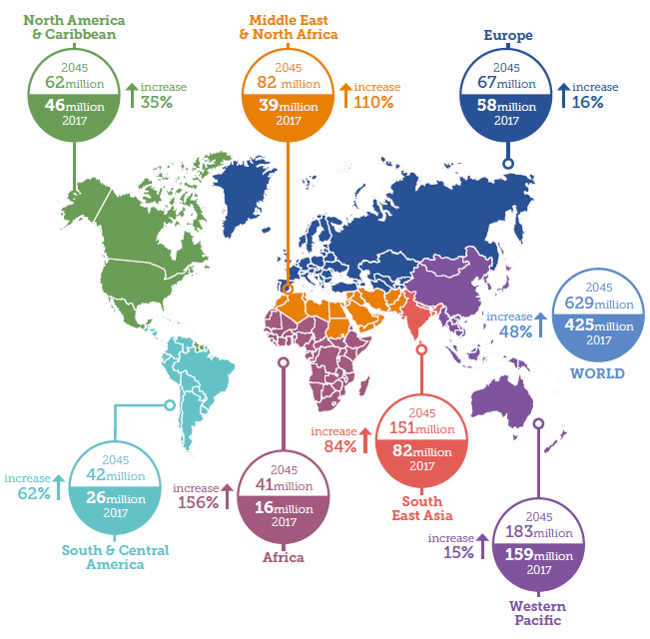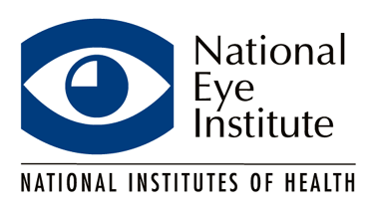
The DRGen Study (Diabetic Retinopathy Genomics Study), a multi-center, multi-ethnic study will use the next generation technology to understand the genetic mechanisms of diabetic retinopathy - one of the leading causes of blindness in the world. Our study aims at identifying novel genetic variants that can predispose to, or protect from this complication. We believe that this knowledge will ultimately help in development of novel biomarkers, new drugs, and precision medicine.
About 425 million adults have diabetes in the world; by 2045 this will rise to 629 million. The increasing global epidemic implies an increase in the rates of diabetic retinopathy – one of the five most important causes of visual loss in the US population. About 30 million people in USA have diabetes, and 1.5 million new cases of diabetes are diagnosed every year. The prevalence of diabetic retinopathy exceeds 40% with about 10% causing vision-threatening complications.

Although control of blood glucose, blood pressure and lipid level can prevent and slow down the progression of DR, an analysis of the DCCT cohort has revealed that hemoglobin A1C level and duration of diabetes explain only 11% of the variation in retinopathy risk. This suggests that other mechanisms, including genetic factors may be additional determinants.
Your genome consists of genes, short segments of DNA that code for proteins, which determines each person’s unique characteristics. Many, if not most, diseases have their roots in our genes. Genetic testing can help researchers to better understand the causes and symptoms of different diseases. Genes are passed on from parents to their children, which explains why certain traits (i.e. eye color, pre-disposition to certain diseases, etc.) are inherited. This genetic testing could provide information about traits that were passed on to you from your parents, or from you to your children.
Whole exome sequencing only records the protein coding regions of the genome, which is 1% of total genome. The places on the genome that contain genes are called exons. Scientists use the term exome to represent protein-coding regions of the genome. Exome sequencing is a research test that can provide various types of results for example (a) We can find gene variants that are known to cause or contribute to disease, (b) We can find gene variants that are not known to cause or contribute to disease, (c) We can find gene variants that are novel and of uncertain clinical importance.
In the DRGen Study, we seek to understand better the role of rare genetic variants in progression, or protection of diabetic retinopathy.
Are there genetic variants for advanced DR phenotypes like diabetic macular edema (DME) and proliferative diabetic retinopathy (PDR)?
Why are some diabetic patients ”protected” from DR in spite of long duration of diabetes?
We will study two ethnic populations, mainly Hispanic at UNM and Caucasians at Joslin Diabetes Center, Harvard University, Boston, and also test what genetic factors account for this racial disparity in disease prevalence. Blood samples will be sent to Translational & Genomic Research Institute (TGen) in Phoenix, AZ for whole exome sequencing and analysis.

UNM Eye Clinic is the main Coordinating Center that will be responsible for overall data management, monitoring and communication among all sites, and general oversight of the conduct of the research project.
Principal Investigator:
We are collaborating with leaders in the Genomics field and Diabetic Retinopathy. We have assembled a collaborating team of clinicians, laboratory scientists, bioinformaticians, and statistical geneticists with expertise in multiple disciplines for success of this project.
![]()
Joslin Diabetes Center (JDC) is the main Retinal Image Reading Center that will be responsible for analysis of the ultra-widefield retinal images of all diabetic patients in this study. Clinical data will be harmonized to reduce heterogeneity of different retinal phenotypes. JDC will also enroll patients with different phenotypes of diabetic retinopathy.

TGen is the main Genomics Center that will be responsible for whole exome sequencing and data analysis of all diabetic patients in this study. With all its laboratory scientists, bioinformaticians, and statistical geneticists and experts in genetics and genomic approaches, TGen is the leader in the field of unraveling genetic components of common and complex diseases.


University of New Mexico Health Sciences Center Eye Clinic
2211 Lomas Blvd NE
Albuquerque, NM 87131
Contact: Arup Das, MD, PhD
Ph: 505-272-6120
Joslin Diabetes Center
William P. Beetham Eye Institute
One Joslin Place
Boston, MA 02215
Contact: Tanya Olesker
Ph: 617-309-4681
Email: Tanya.Olesker@joslin.harvard.edu